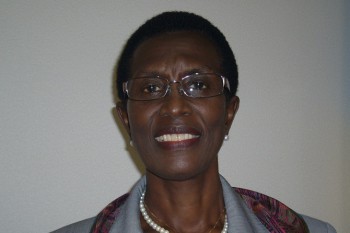Events
Implementation, Monitoring and Transparency Makes Rwandan Miracle
— How has Rwanda achieved the recent remarkable economic growth which is called “miracle of Africa”?
In 1994, we had a devastating Genocide against the Tutsi in which one million died. It shattered all institutions of governance including national courts, police and so on. When the new government ended the genocide, they tackled the rebuilding of the nation and the people’s reconciliation through dialogue with the people. “Vision 2020” was formulated in 2000, and the 2003 Constitution were born from this national consultative process. The strategy aims to transform the country from an agriculture-based economy to a knowledge based economy, realizing a middle–income country by 2020. The main pillars of the Vision are good governance, private sector strengthening, human resources development, health etc. It aims to make the legal and institutional framework work, and to build a strong and competent nation based on the rule of law through decentralization, transparency, accountability, effective management. Strengthening of the private sector through wide ranging reforms is also important. Rwanda met most of the Millennium Development Goals (MDGs) by substantial improvements in living standard, including all the health related MDGs and a12 year universal free education for all. Between 2001 and 2015 Rwanda’s real GDP growth averaged about 8% p.a. and tourism, agriculture, services and ICTs together with increase of trade and foreign direct investment contributed to this growth. Rwanda has been successful above others because of strict implementation, strong monitoring and transparent management at the Government.
— Has Rwanda overcome the wounds of the genocide of the mid-1990s?
Rwandan people share the same culture and language, and the most homogenous community in Africa. They had been united and had lived together in peace and harmony for centuries. During the colonial period, however, the Belgian administration deeply divided the people by ethnic group and institutionalized discrimination, culminating in the 1994 genocide. After the genocide, national unity, reconciliation and justice became the immediate priority for the new government. Rwanda returned to a homegrown solution, and the Gacaca justice system was adopted for majority of the genocide perpetrators. It was traditional communal justice based on the practices from pre-colonial time. It was a restorative justice but also fostered national unity. Ethnic classification was abolished and none of the people is discriminated now. Very elaborated mechanism was formed for the process of the unity and reconciliation, and healing of the society has been pursued. Remarkable development successes, including reduction of poverty and inequality, have been part of what makes Rwandan miracle. Wounds have healed with the help of the government and the international community, but scars and trauma has remained especially among the survivors.
— Rwanda is ranked first in Africa and fifth worldwide by the WEF Global Gender Gap Report 2016. Would you explain the situation of women’s advancement in Rwanda?
Rwandan women make up 52% of the population and are very important part of the population. After the genocide, the government launched a gender equality policy and Rwandan women have played an important role in social healing, conflict resolution and peace building efforts. The 2003 Rwandan constitution provides for a minimum 30 % quota for women in all decision-making institutions and organizations. Women secure 64% of seats in the Parliament which is the highest in the world. They are very high percentages also in other institutions and the private sector. There is no positive discrimination for women in schools or for jobs and equal pay for all in the same position. Women can own the land and inherit equally. The success of the gender equality and women empowerment in Rwanda is due to the right policy and institutional mechanism, the” Gender Machinery”, which includes the Ministry of Gender and Family Promotion.
— How do you see the recent development of Rwanda-Japan relations? What is your priority mission for further strengthening the bilateral ties?
Japan and Rwanda have established a very friendly and cooperative relationship which is still growing. Japan is also an important development partner for Rwanda through JICA. Development programs with JICA include electricity networks, road and bridge construction, agriculture and irrigation, rural water supply, e Health, skills development in ICT and support for Japanese business in high technology and so on. We also receive Japanese volunteers from JICA. The Rwanda embassy focuses mainly on promoting economic relations between Rwanda and Japan. Rwanda is fast developing economy and we provide safety and good business climate for Japanese companies. We visit them and organize a business mission to Rwanda. In September we will participate in a coffee conference. We are also promoting Rwanda’s tourism diversities including gorilla trekking tour to the Japanese people. We promote people to people exchanges by reaching out to the academia, local governments and the youths in Japan and linking them with those in Rwanda. We believe that such efforts can further deepen and widen our good relations.
— What opportunities can Japanese companies expect for investing in Rwanda?
Rwanda has investor friendly climate and is one of the most competitive places to do business in Africa. Rwanda Development Board provides to investors all necessary information and services as one stop center, and it takes only 6 hours to register a business in Rwanda. We have many investment opportunities for Japanese corporations such as infrastructure, agribusiness, energy, ICT, manufacturing, health services, and education and so on. Rwanda has an array of investment incentives for investors ready to invest in the key priority sectors.
